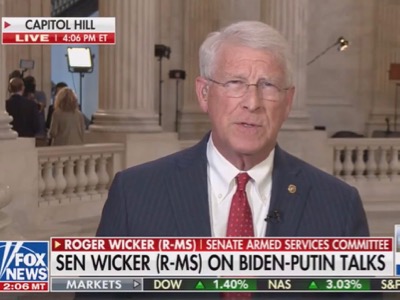«THE ART OF WAR»
The Ukrainian powder keg and the fuse
According to the Washington narrative, Russia is massing its troops on the Ukrainian border and is preparing to invade in January. NATO would be ready to defend Ukraine from the Russian bear. In reality, it is Ukraine that is at fault: it has still not respected its signature and implemented the Minsk agreements, while Russia does not mass any troops on its border, but it has always had large bases in Crimea and now uses the bases of Yelnya and Boyevo, which are very far from Ukraine (750 and 830 km). No matter, Washington is beating the drum.

Roger Wicker, a member of the US Senate Armed Services Committee, said in an interview with Fox News (December 8, 2021) that he would not rule out direct US military intervention against Russia to "defend Ukraine" and, without being asked by the interviewer, added: "You know we don’t rule out nuclear action as a first use", i.e. to use nuclear weapons first. This is a cross-cutting message to Moscow about the determination of the United States to support a possible attack by Kiev on the Russians in Donbass. It would certainly be presented as retaliation for an attack by the Russians in Donbass. In the minds of those who have been carrying out the strategy of tension against Russia since 2014, such an attack would in any case be a winning act.
Moscow would have two alternatives: not to intervene militarily in defence of the Russians in Donbass, allowing them to be overwhelmed by the NATO-backed Ukrainian attack and forced to abandon the region to take refuge in Russia, a decision that would be traumatic for Moscow above all internally; or to intervene militarily to stop the Ukrainian attack, exposing itself to international condemnation for aggression and invasion of a sovereign state.
Ukrainian generals have warned that they will not be able to "repel Russian troops without a massive infusion of military aid from the West". The infusion has already begun: the US, which has already given Kiev $2.5 billion in military aid, provided it in November with another 88 tonnes of ammunition as part of a $60 million "package", including Javelin missiles already deployed against the Russians in the Donbass. At the same time, the US has sent more than 150 military advisers to Ukraine, who, together with those of a dozen NATO allies, are in fact directing operations.
The situation is even more explosive because Ukraine - today a partner but, in fact, already a member of the Atlantic Alliance - could be officially admitted as the 31st member of NATO: and as a result, on the basis of Article 5 of the North Atlantic Treaty, the other 30 NATO members would have to intervene militarily on the Donbass front to support Ukraine against Russia. The Russian Foreign Ministry called on NATO not to admit Ukraine, so as not to further increase military and political tension in Europe, recalling that since the end of the Cold War, Russia has received repeated assurances that the Alliance’s jurisdiction and military forces would not be moved an inch eastwards, but that these promises have not been kept. The Russian Foreign Ministry then proposed to NATO to open negotiations for long-term agreements preventing further expansion of the Alliance to the East and the deployment of weapons systems in the immediate vicinity of Russian territory. The proposal was curtly rebuffed on December 10, by NATO Secretary General Jens Stoltenberg: "NATO’s relationship with Ukraine will be decided by the 30 members of the Alliance and by Ukraine, and by no one else".
Immediately afterwards, yesterday December 13, the G7 foreign ministers (US, Canada, UK, France, Germany, Italy, Japan) and the EU High Representative, who met in Liverpool, said they were "united in condemning Russia’s military build-up and aggressive rhetoric towards Ukraine" and that "Russia should be in no doubt that further military aggression against Ukraine would have massive consequences and serious costs".
Meanwhile, Finland, an EU member and active NATO partner against Russia, has announced the purchase of 64 Lockheed Martin F-35A fighter jets for a price of 8.4 billion euros, which, with their infrastructure, amounts to 10 billion euros, to which the government will add another 10 billion euros for their maintenance and modernisation. The 64 F-35A nuclear attack aircraft will be deployed on Russia’s borders, just 200 km from St Petersburg, under the command of the US, which, as Senator Wicker reminds us, does not rule out the possibility of using nuclear weapons first.
Roger Lagassé
Il Manifesto (Italy)





/https://www.niagarafallsreview.ca/content/dam/thestar/news/canada/2021/09/25/huawei-executive-meng-wanzhou-receives-warm-welcome-upon-return-to-china/_1_meng_wanzhou_2.jpg)













No comments:
Post a Comment
Note: Only a member of this blog may post a comment.